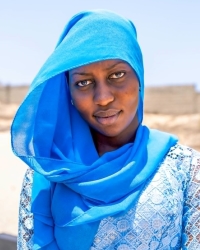The Fulakunda are a sub-group of the Fulani (or Fula), a vast cluster of peoples living throughout central and western Africa. Most of the Fulani are nomadic herdsmen, and almost all are Muslim. They are separated and grouped according to language, location and occupation.
As the Fulani migrated southward to and through Guinea Bissau during the fifteenth century, some of them mixed with the Mandingo in the area. Those who intermarried with the Mandingo were considered "black" or preto. These Fulani became known as Fula Preto or Fulakunda. They speak Fulakunda (or Pulaar), which belongs to the West Atlantic branch of the Niger-Congo language family. They live among the Mandingo and Tukulor peoples in the forests of southern Senegal.
Although the Fulakunda have mixed cultures and are willing to intermarry with the other groups in the area, they still practice many of the customs and traditions of the "pure" Fulani. Their lives center around their herds of cattle or sheep. In fact, the more cattle one owns, the wealthier he is considered to be. In addition, some Fulakunda are hired as herdsmen for various kingdoms in the Sudan, just as their fathers were before them.
Mixing farming with herding, the Fulakunda consume grains and milk as their staple foods. They seldom eat meat. Only during important formal events, such as the "naming ceremony" or at the birth of a first son, will they consume beef. Donkeys, chickens, and dogs are kept on their farms. They have a very hard time trying to grow food during the long rainy season. They grow cotton, millet, corn, and peanuts as cash crops.
The wuro (village) is the center of Fulakunda society. It is there that the women do most of their work. They prepare the evening meal, which takes about four or five hours each day. They also gather grass and twigs for the construction of their huts. Milking the cattle and preparing butter are other important chores. The men herd the cattle and dig wells. Sons over the age of 15 assume their fathers' work.
At 15, a boy builds and begins living in his own hut, which he will eventually share with his first wife. Subsequent wives will be given huts of their own. A Fulakunda may have as many as four wives, as long as they are treated equally. A girl is often "lent" to a man to see if she will work well with the first wife. The prospective husband will visit and give gifts to the girl's family until the marriage is official.
Although they may lack a scholarly grasp on book knowledge, they are considered skilled social analysts. Some Fulakunda elders have traveled in many countries and know the language, people, and culture of each.
The Fulakunda hate to feel alone. However, they tend to hide their feelings, and the need for love and companionship is not expressed in public. Only through songs is this need freely acknowledged.
The Fulakunda are a Muslim people, follow the teachings of Mohammed, and adhere to virtues and good morals such as justice, honesty, generosity, and patience. Some Fulakunda have converted to Islam from old animistic beliefs within the last 60 years. Leather pouches having verses from the Koran often replace other types of charms.
The Fulakunda think of the village as a place of rules and obligations - a place for socially acceptable behavior. The bush, on the other hand, is a place of freedom, where they can act according to their own needs.
They are expected to follow a code of high moral behavior known as Pulaaku. Pulaaku extols virtues such as kindness, bravery, patience, tolerance, perseverance, honesty, diligence, generosity, and dignity. To be reserved is part of being dignified; thus, they are shy and modest in public. A mother does not show affection to her infant son. In fact, she never even calls her firstborn by his name all throughout his life.
Although some Christian resources are available, only a very small number of Fulakunda have become Christians. Only six years of education is provided for children, but many leave school earlier. Many village children don't even start school. Those who continue their education often can't find higher paying jobs and return to the villages. Perhaps Christian teachers will have the greatest opportunity to work among these Muslims.
The Fulakunda are very devoted to Islam, probably because they were responsible in helping spread it throughout much of Africa. Fervent prayer is needed to break the stronghold Islam has on their lives.
Pray that the Lord will make a way for Fulakunda believers to be discipled well and be bold witnesses and disciple makers.
Ask the Lord of the harvest to send loving Christian laborers to work among the Fulani.
Pray for effectiveness of the JESUS Film among the Fulani, with many giving their lives to Jesus Christ.
Ask God to anoint the gospel as it goes forth via radio in their area.
Pray that God will give Fulani believers opportunities to share Christ with their families and friends.
Pray for Fulakunda women to discern truth from false teachings and to be the bringers of the gospel to their families.
Scripture Prayers for the Fulani, Fulakunda in Senegal.
https://www.imb.org/55-in-5-resource/fulakunda-of-senegal/
https://www.britannica.com/topic/Fulani
| Profile Source: Joshua Project |










